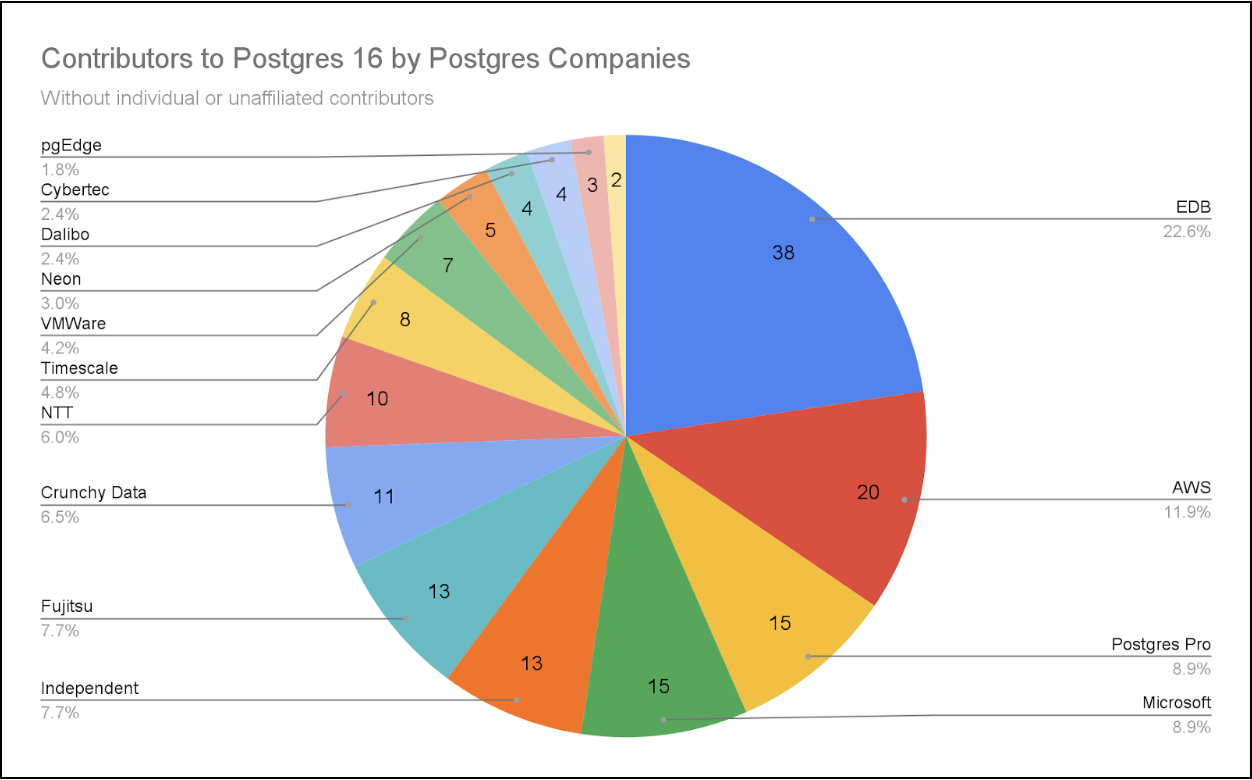This blog is one of two analyses of the contribution to PostgreSQL 16, which was released in September 2023. This blog focuses on the companies that support Postgres’ development, another blog builds on Robert Haas’ analysis of the individuals and their contributions to Postgres 16. Both blogs look at critical components of the Postgres open source evolution:
- Which companies, and especially software companies active in the Postgres space, devote resources to the development and furtherance of Postgres
- Which companies, through their team members, have the biggest impact on Postgres.
This blog focuses on (1). (2) is discussed >>here<<
A few numbers (all as of January 31 2024)
- The Core Team has seven members. Their job is to keep things going and coordinate release activities. Details of the Core Team roles and responsibilities are described here: https://www.postgresql.org/developer/core/
- 31 Committers can commit code changes or integrate new code into the PostgreSQL repo (https://wiki.postgresql.org/wiki/Committers)
- 40 Major Contributors, who tend to have areas of specialization (https://www.postgresql.org/community/contributors/)
- 94 Named Contributors have contributed to multiple past releases (https://www.postgresql.org/community/contributors/)
- 360 people contributed directly to PostgreSQL 16 as patch authors, committers, reviewers, testers, or reporters of issues. See the release notes for details: https://www.postgresql.org/docs/current/release-16.html.
- Some of the world’s largest software companies, such as AWS, Fujitsu, Google, Microsoft, NTT, and VMWare invest heavily in Postgres, thus making sure PostgreSQL is vibrant, healthy, and innovative.
- All in all 416 people from 109 companies were involved in making PostgreSQL 16 one of the best databases, without considering the countless others who contributed to earlier releases or invested time and effort into the Postgres community movement as organizers, speakers, or volunteers.
When we dig a little deeper into the list of companies that are involved in the development of PostgreSQL 16, we see that while many companies participate with 1-2 team members, 13 companies invest a significant number of resources into Postgres.
The companies with 1-2 team members contributing to Postgres are very important as they tend to be software companies building on PostgreSQL or integrating PostgreSQL with their products. That makes them user-developers intimately aware of the value and quality they produce.

Understanding who the companies are that have many team members involved in PostgreSQL development is crucial for users of PostgreSQL, especially enterprises and government institutions who leverage PostgreSQL for mission-critical applications. While PostgreSQL is very stable and rarely sees production-impacting problems, it has over 1,000,000 lines of code -- and when things go sideways, it is important to have a partner who is equipped to help. While not every issue requires software fixes, it is important to have expertise in all areas of the code base to be able to help with bugs, performance issues, and ‘how-to’ questions in an effective and efficient way.
I am drawing the line to qualify as a ‘Postgres Software Company’ at three team members who are contributing to PostgreSQL. IMHO, any company that has less than three team members actively involved in PostgreSQL cannot claim to provide enterprise support and deliver a credible service level for mission critical applications.
There is a second, less obvious reason to understand this list: Enterprise needs evolve over time. The PostgreSQL of today may not be what is needed in 2-3 years. Having a partner who is active in the PostgreSQL development and can help evolve the software is very important.
Data is the new oil, and managing it well is a strategic imperative. Databases are no longer static vessels. They enable and drive enterprise strategy. Without a doubt, PostgreSQL will evolve. The future PostgreSQL may very well integrate AI features, have new analytics capabilities, integrate new data formats, and meet yet unknown security requirements. Having the right partner to make sure PostgreSQL evolves fast enough and in the right direction is absolutely imperative.
